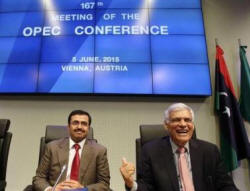 Concluding a meeting with no apparent dissent, Saudi
Arabian Oil Minister Ali al-Naimi said the Organization
of the Petroleum Exporting Countries had rolled over its
current output ceiling, renewing support for the shock
market treatment it doled out late last year when Saudi
Arabia, the world's top supplier, said it would no
longer cut output to keep prices high.
Concluding a meeting with no apparent dissent, Saudi
Arabian Oil Minister Ali al-Naimi said the Organization
of the Petroleum Exporting Countries had rolled over its
current output ceiling, renewing support for the shock
market treatment it doled out late last year when Saudi
Arabia, the world's top supplier, said it would no
longer cut output to keep prices high.The group will meet again on Dec. 4, Naimi said.
With oil prices having rebounded by more than a third after hitting a six-year low of $45 a barrel in January, officials meeting in Vienna saw little reason to tinker with a strategy that seems to have resurrected moribund growth in world oil consumption and put a damper on the U.S. shale boom.
Naimi, emerging from the talks, said he was happy with the decision. He told reporters ahead of the meeting that he was confident production from marginal fields would fall even at current prices.
"The decision taken in November was the right one," United Arab Emirates energy minister Suhail bin Mohammed al-Mazroui said earlier, referring to OPEC's previous meeting. "It will take time for the markets to rebalance."
Friday's decision defers discussion of several tricky questions set to arise in the coming months as members such as Iran and Libya prepare to reopen the taps after years of diminished production.
Iranian oil minister Bijan Zanganeh had promised to press the group for assurances that other members will give Tehran room to add as much as 1 million barrels per day (bpd) of supply once Western sanctions are eased. But most delegates had seen little reason for Tehran to pick a fight now.
"When the production comes, this matter will settle itself," one OPEC delegate told Reuters. That may not occur until 2016, according to many analysts who question how quickly Tehran will win relief from sanctions and be allowed to sell more crude.
Libya, still afflicted by a crippling civil war, hopes to double production to some 1 million bpd by September if key ports resume working, but past efforts have failed to deliver a sustained recovery in shipments.
Brent crude futures slipped below $62 per barrel on Friday, nearing their lowest price in seven weeks, and U.S. oil is on track for its first weekly decline since March as traders anticipate a rollover decision and see weakening physical market conditions. But prices are still $15 off their lows, and some analysts see further gains ahead.








